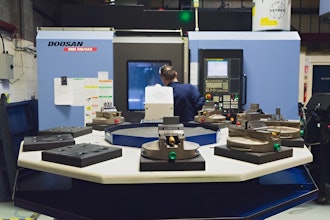Not long ago, manufacturers could achieve success and even dominance by simply producing a quality product at a fair price. But today, the world has changed dramatically. Globalization, digitization, Ecommerce and customer empowerment have forced manufacturers to rethink the ingredients for success in fast-moving global markets.
Manufacturing success today depends on flexibility and innovation. It demands streamlined business operations and granular visibility into all costs associated with a product. Collaboration with global suppliers, distributors and logistics providers is essential to optimizing supply networks to meet the speed and quality expectations of B2B and B2C buyers alike.
Recently at the Executive Smart Manufacturing Summit, Ford Motor Company President and CEO Alan Mulally discussed this new reality. The company has reinvented its manufacturing processes around the concept of flexibility while condensing 97 global models to fewer than 20. Ford can now turn out as many as five distinct vehicles from a single line.
With its new focus on flexibility, Ford is better able to adapt to changing market dynamics, has improved synergies across multinational operations and reduced costs through consolidation and eliminating redundancies. As a Fortune 50 multinational giant, Ford was able to commit substantial resources into retooling its operations — something not viable for the majority of manufacturers.
Without a huge investment, manufacturers that continue to run conventional on-premise ERP systems can find themselves walled in by inflexible technology infrastructures that need months or even years of customization and re-integration to make the rapid changes demanded by the global marketplace. Most manufacturing businesses that aspire to innovation, flexibility and global efficiency can find themselves disadvantaged by the very systems meant to drive growth.
The Road to Modern Manufacturing
Cloud ERP solutions pave the way for modern manufacturing processes because they can be deployed anywhere in the world, localized to the appropriate currencies, languages, and formats while maintaining “anywhere, anytime” access to all key business data and processes. Instead of wasting valuable time and money extending an organization's legacy IT tools, cloud ERP solutions such as NetSuite can be deployed to any warehouse, factory floor or sales office with an Internet connection. Leading manufacturers are rolling out cloud ERP to run global subsidiaries and divisions, in a two-tier model that delivers operational excellence, deployment flexibility, and speed-to-value.
Cloud solutions are designed to minimize supply chain costs by providing real-time access to worldwide supplier and logistics providers through standard industry and web interfaces — eliminating additional integration costs just to bring new suppliers online. The most powerful, comprehensive cloud ERP suites natively speak the language of ecommerce, making it easy for manufacturers to expand their customer intimacy and collaboration, delivering a more engaging experience to their clients.
Cloud ERP empowers manufacturers to adapt to new market demands with predictable, timely access to new functionality and integrated third-party modules, which is why Gartner predicts that 47 percent of manufacturers worldwide would be using or piloting software as a service (SaaS) applications by 2015, up from just 2 percent in 2009.[1]
Unleashing Flexibility and Innovation
Cloud solutions have been at the core of some of the most intriguing manufacturing successes of this young decade. For example, EndoChoice of Atlanta, Georgia, has evolved from a commodity source for medical and surgical products to a branded manufacturer of procedure-ready kits, specialized for the needs of gastrointestinal procedures. Once the company identified the untapped demand for bundled kits, it quickly changed course and shifted from a distribution model to a manufacturing mindset.
This innovation has helped EndoChoice sell to 34 countries worldwide, and enabled it to be named to the Inc. 500 fastest growing company list three years in a row. EndoChoice was able to simply add manufacturing modules to the existing NetSuite solution that supported its distribution business, sparing it the time and expense of bringing in a new ERP solution to support unique manufacturing requirements.
Oklahoma City's Flogistix manufactures vapor recovery equipment for the oil and gas industries. The recent gas exploration boom has Flogistix very busy, but not all of the company's customers can afford to buy the well-head equipment outright. Moving its systems to NetSuite last year enabled the company to treat sales, leasing and service operations as unified components of a single, thriving business and support management's goals of boosting sales and revenue 50 percent this year.
The cloud positions manufacturers to engage multiple stakeholders anytime and from anywhere—not just those locations blessed by the corporate data center after months of intense IT labor. Changes made in a cloud solution, whether a single inventory value or an entire complex workflow, are immediately propagated throughout the entire enterprise, with no need to worry about software upgrades and database rebuilds.
In short, the cloud provides the only technological platform with the visibility, flexibility and adaptability to support the practices today's manufacturers must embrace to remain leaders.
[1] Gartner, “Market Trends: Cloud Computing and SaaS Adoption in Manufacturing and Natural Resources Worldwide,” March 23, 2012.






















